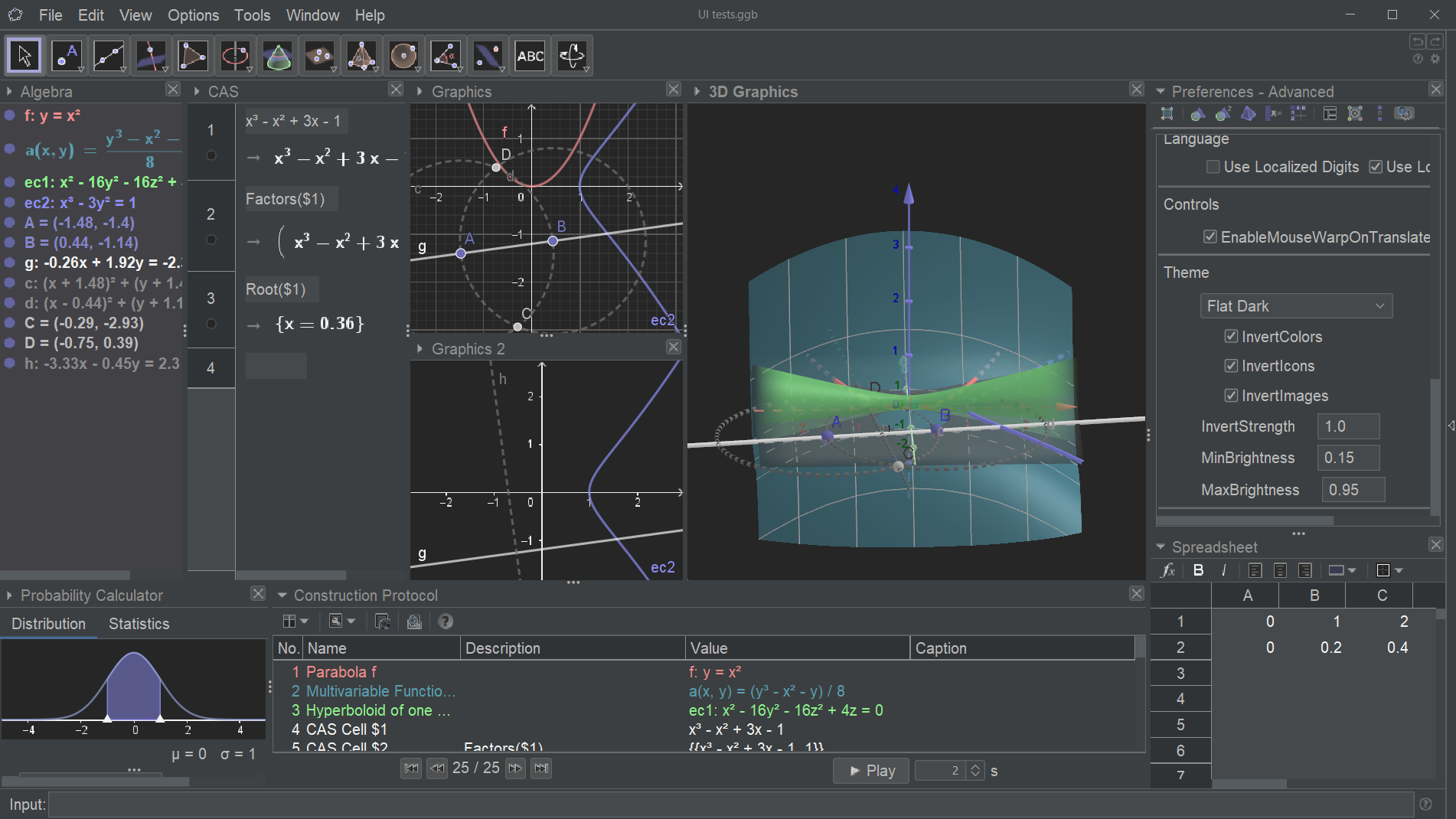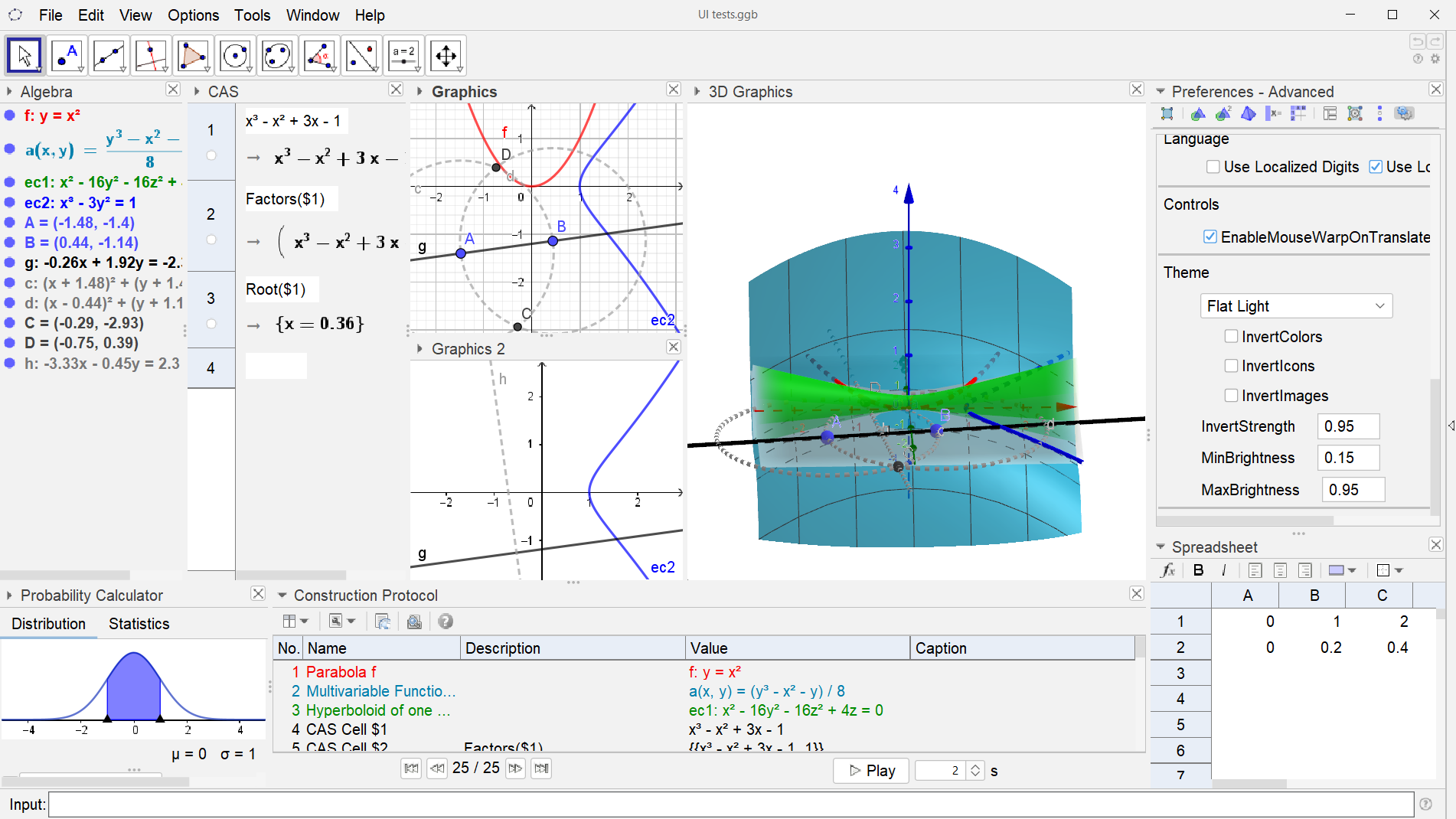This is a fork from GeoGebra (https://www.geogebra.org/). The original code from this project can be found at the official GeoGebra mirror repository on GitHub.
This fork was created in order to add the following features to the classic Desktop version of GeoGebra:
- Dark Theme support (using FlatLaf, and inverting colors from objects/images/icons)
- Java version updated to Java 17 (which means correct scaling on Hi-DPI devices)
- Mnemonics on menus and dialogs (assigned automatically)
- Infinite view dragging (mouse is warped within the view's bounds, like in Blender)
- Hotkey to focus algebraic input bar (F5)
These features were developed purely for my own personal use, as the GeoGebra developers seem to not have any plans to add them in the near future (in particular, the dark theme). Unfortunately, some people do not consider a dark theme feature an accessibility requirement for any user interface.
The implementation of these features focuses exclusively on the desktop
module and makes no effort to support them in other platforms neither now
nor in the future.
I have made no effort in updating nor running any tests included in the code,
nor any module not required by the desktop module.
You may use this fork at your own risk, for non-commercial purposes, and without any official support from GeoGebra GmbH (nor me). I have decided to share this fork in the hope that it may be useful to someone in my same situation and for no other purpose.
I do not plan to actively maintain this repository, but I may (or may not) be able to help you with problems getting it to work if you create an issue.
The use of this project shall be governed by the GeoGebra License above anything else, as permitted by applicable laws.
This project itself falls under the category of Non-commercial Use of GeoGebra. All copyrighted materials, graphics and other resources included in this repository belong to the GeoGebra GmbH ("GeoGebra"), and are used only for non-commercial purposes.
Any installers provided in this repository are not official nor endorsed by GeoGebra in any way, and are provided merely for the convenience of people without the means or ability to build them themselves. You may use, copy, distribute, modify and transmit them at your own risk, without ANY warranty and for non-commercial purposes only.
The code itself is licensed under the GNU General Public License (version 3 or later), as published by the Free Software Foundation, as expressed by the GeoGebra License.
The GeoGebra language files, all GeoGebra documentation and all other documentation files potentially found in this repository, and all GeoGebra user interface image and style files are used and licensed under the terms of the Creative Commons Attribution-NonCommercial-ShareAlike license (version 3.0 or later), as expressed by the GeoGebra License.
The Software (and all related materials and resources) are licensed to you without ANY warranty nor promise of support or future development by the GeoGebra GmbH, the developer of this fork or any third party.
For more detailed information, see the LICENSE file and the GeoGebra License, in case I haven't linked to it enough.
The primary site for GeoGebra's source code is https://dev.geogebra.org/svn/trunk/geogebra/ which is a read-only Subversion repository.
The GeoGebra team maintains a copy of it at https://github.com/geogebra/geogebra.
Please read https://www.geogebra.org/license about GeoGebra's licensing.
To learn more on development of GeoGebra (including suggested compilation steps) please visit https://dev.geogebra.org/, and the official GeoGebra mirror repository on GitHub.
- Open IntelliJ. If you don't have IntelliJ on your computer yet then you can download and install it from here
- In the menu select
File/New/Project from Version Control/Git - In the new window add the following path:
https://github.com/endorh/dark-geogebra.git - Click on
Checkout, select your preferred destination folder, select Java 17 as the SDK, click on OK and wait… - After the project is checked out, select the root folder of the project,
open the Run Anything tool (Double Ctrl) and run the following command:
./gradlew :desktop:run, as explained below - After a few minutes the Desktop UI will appear. Note that compiling GeoGebra requires the download of a few dependencies. The first compilation will take considerably longer as all necessary modules will need to be compiled. Go drink a coffee, take a walk, read a book... you get it.
To start the desktop version from command line, run
./gradlew :desktop:run
You can also run ./gradlew :desktop:tasks to list other options.
If you're using IntelliJ (which you should), you may also pick the
desktop/application/run task from the Gradle Tool Window, or create a
run configuration for it.
To generate a desktop installer for the desktop version, run the following command on the desired platform (Windows, Linux or macOS) (installers can only be generated on their target platforms):
./gradlew :desktop:jpackage
The generated installers will be located within the desktop/build/jpackage directory.
If you're using IntelliJ (which you should), you may also pick the desktop/build/jpackage
task from the Gradle Tool Window.
If you despise your eye health so much, yes, you can still use the light theme. Dark GeoGebra provides a flat version of the light theme, as well as the classic themes from GeoGebra.

